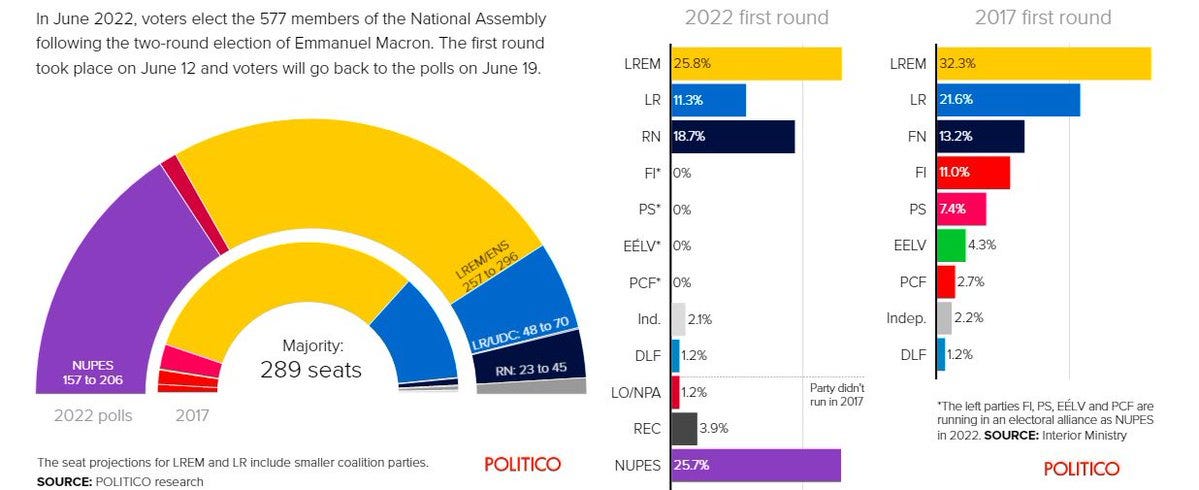🇫🇷🗳🍷 The French Election Twitter Summit: Final round
Join us for one last summit before we finally stop voting. (For a few years, at least.)
🍷 Today, at 4:00 pm Paris time, join Arun Kapil, Jérôme Clavel, Anne-Elisabeth Moutet, and moi before the final round of the French parliamentary elections. After this, no more elections in France until the 2024 elections to the European parliament.
→→→→Here’s your link.
And here’s your background reading …
The polls show Macron’s alliance winning the largest bloc of seats but may fall short of an absolute majority (289 seats) in the new Assembly.
In the face of international crisis, France has lost the plot, writes John Lichfield:
France’s parliamentary elections are only halfway through, but the seemingly inevitable result is a muddle that will leave France unable to react rapidly to the growing international and economic crisis.
The French legislative elections: between the rounds, by Arun Kapil, who politely discusses inter alia Cole Stangler’s article in the New York Times:
One piece on the election that has been receiving attention, as it was published as a guest essay in The New York Times, is by the Marseille-based, decidedly left-leaning American journalist Cole Stangler, who informed readers that “Something extraordinary is happening in France,” that extraordinary something being the Jean-Luc Mélenchon-led NUPES, on which I opined in my post last week. Just about every reaction I’ve seen to the essay on social media has been a gushing thumbs up to Stangler’s enthusiastic assessment of the NUPES …
I’m in general sympathy with his views, but he’s wildly over-optimistic as to the prospects for the Nupes and simply wrong on many points. If the Nupes wins a majority of seats and Mélenchon is appointed PM—neither of which will happen, but assuming they do—this would be terrible, indeed disastrous, for France, Europe, and ultimately for the left. The Nupes’ economic program is, pace Thomas Piketty & Co, pie-in-the-sky, i.e. it’s nuts, and JLM’s views on geopolitics are unacceptable. A French PM who is not fully committed to materially supporting Ukraine against Russia—and reiterating France’s commitment to NATO—is not in anyone’s interest apart from that of Vladimir Putin. A Macron-Mélenchon cohabitation is totally impossible.
A generational divide, by Arthur Goldhammer:
In the past, a handy way to describe Macron’s base was to say it consisted of people who were doing relatively well. Apparently, this is no longer the case. Voters with diplomas and jobs are nevertheless abandoning Macron for la NUPES. Why? Any number of explanations are possible, and the data are not detailed enough to distinguish among them. Le Monde suggests that these NUPES supporters are people who have careers but find their hopes of advancement frustrated. Perhaps they expected Macron to restructure things so as to give them a boost but found that he simply perpetuated the existing hierarchies. Commitment to environmental protection is also stronger in this group, which may find Macron’s inaction on this front unacceptable. No doubt there are also many in these groups who think of themselves as on the left yet voted for Macron in 2017 only to feel betrayed when his government took a rightward turn.
An Optimistic Scenario, by Arthur Goldhammer:
Yesterday I wrote that a) la NUPES would not win a majority in the legislature but b) would win enough votes to deprive Macron of an absolute majority, and that this would have the paradoxical effect of forcing Macron to seek the support of Les Républicains, thus driving the president even farther to the right than he would prefer to govern. Any number of other commentators have voiced similar sentiments, including Thomas Legrand on France Inter and today in the New York Times the left-wing journalist Cole Stangler, who writes: “France’s winner-take-all system gives an advantage to the more mainstream Republicans, who would be more natural governing partners for Mr. Macron.”
But there is another and to my mind more optimistic scenario in the offing. While it is true that la NUPES will nominally constitute the primary opposition to Macron, there is absolutely no guarantee that this loose electoral coalition will remain united on all issues. On particular measures, especially those relating to environmental issues, the government can seek the support of the Socialists or Greens, say, rather than trying to woo LR. And since we are now told that Macron is not wedded to the pension reform that has driven a wedge between him and the moderate left–“Macron sur les retraites: «64 ou 65 ans, je m’en fous!», as Libé headlined yesterday–compromise on issues of mutual concern seems within reach.
And Alexander Hurst writes:
If this were the US, where government spending is 46 percent of GDP, I’d say, ok sure. “Price caps” and “everyone gets more money!” is insanity in a country where gov share of GDP is already 62.5 percent. Hope y’all are into massive shortages of everything and unemployment like ya never seen.
This is fantasy land. There is no way to finance that much additional spending unless you have massive growth. And you won’t get massive growth inside a single market with mobility of people and capital by restricting prices and hiking corporate taxes, you’ll get big unemployment.
Which is obviously why LFI is Frexit-sans-le-dire.
And if you think THAT’S a good idea, well…
Finally—not interested in the French legislative elections? You’re not alone. John Lichfield asks: Why don’t the French seem to care about the crucial parliamentary elections?
Fed up with hearing about them? You’re not alone. France has too many elections and it’s killing politics, writes John Lichfield.
See you at 4:00 pm Paris time today.
Finally, speaking of France: In memory of Rue de Flandre, by Lenny Pitt:








Thank you for a wonderful trip down Rue de Flandre! Loved the sentiment and the execution. A portion of it (around the dining gentlemen) had a strong Italian vibe - maybe contributed to by the music.
1908. Those happy, prosperous people had no idea what horrors would be unleashed in just six years.